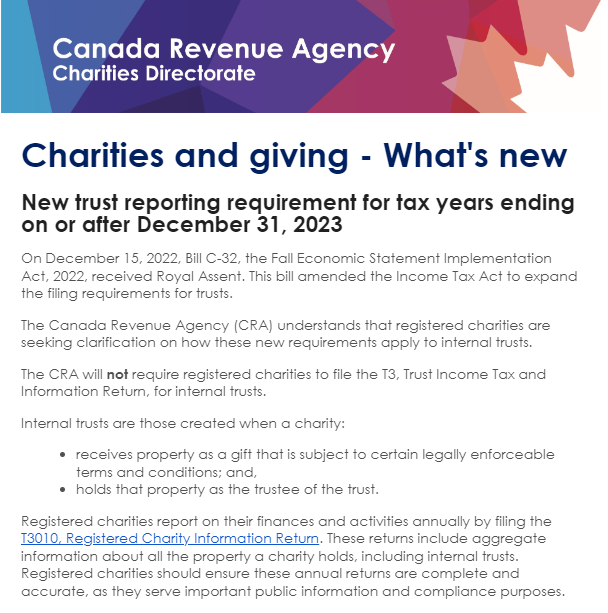Today, CRA confirmed that charities do not have to file T3 returns for internal trusts.
CRA’s Update
We are very pleased to see that CRA will not require registered charities to file separate T3 Trust Income Tax and Information Returns for internally held trusts.
CCCC and many other stakeholders expressed concern over the possibility that charities would be required to file separate returns for internal trusts (in addition to the T3010) as a result of Income Tax Act amendments in Bill C-32.
We encouraged a solution that emphasized simplicity, clarity and timeliness and are thankful for this positive outcome. This means that CRA will continue its sensible administrative position toward reporting for charities that hold internal trusts, as CCCC and many others urged.
This outcome recognizes that all funds held by charities are already reported on the T3010 and are applied to exclusively charitable purposes. It also recognizes the legislative intent for expanding trust reporting requirements was not aimed at registered charities’ internal trusts, and that transparency is achieved through existing reporting requirements.

What are internal trusts?
CRA has clarified that internal trusts are created when a charity:
- Receives property as a gift that is subject to legally enforceable terms and conditions; and
- Holds the property as the trustee of that trust
Background
Bill C-32, Fall Economic Statement Implementation Act, 2022 (Bill C-32) amended the Income Tax Act (ITA) by adding new subsections to section 150, requiring more trusts to file T3 Trust Income Tax and Information Returns (T3 Return) and adding to the list of information reported in the T3 Return as required by the Income Tax Regulations. While trusts that are formed as registered charities are specifically excluded, there was speculation and uncertainty about whether charities’ internal trusts would continue to be excluded.
If the amendments had been interpreted to include charities’ internally held trusts, reports would have been required 90 days after the end of the calendar year. It could have resulted in significant, additional administrative burdens, legal and professional consulting costs, and a lot of extra (unnecessary) paperwork for CRA.
If you’re looking for more on Bill C-32, check out our (long!) post summarizing its key changes.
The content provided in this blog is for general information purposes and does not constitute legal or professional advice. Every organization’s circumstances are unique. Before acting on the basis of information contained in this blog, readers should consult with a qualified lawyer for advice specific to their situation.


